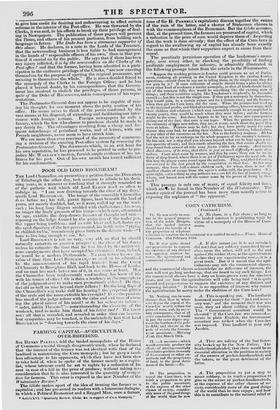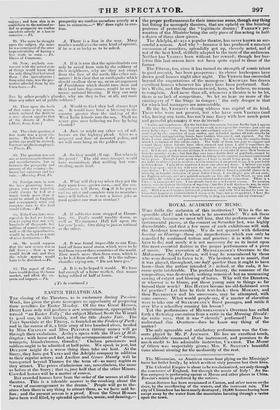74. Ile was ready to con- cur in the general
proposi- tion of the noble Marquis, that the landed interest should have the benefit of a proporf of whatever
A. No share, is a fair share ; as long as the landed interest is prohibiting trade by virtue of a monopoly of the House of Coal- itions.
reduction in taxation the Government was enabled to make.— Times. noun of Commons. 21st February 1134.
-75. It was quite absurd and preposterous to suppose the existenee of any distinct and opposing interest be- tween the agi ieultural and commercial classes. —It. A. If this meant (as it is not certain it
did not) that any robbery committed by One class upon the other, will tell in the end
against the robber class, as the agriculturists declare they are experiencing now,—it is a great truth. But if it meant that the agri- culturists may rob the cornnwreial classes, and the commercial classes acknowledge no difference of interest, the men will not go long unshut-up, that are beard to say such things. Let the commercial classes have a duty on home-grown corn for nineteen years, and see how the agriculturists will take being told "it is quite absurd amid preposterous to suppose the existence of any distinct and opposing interest." If there is no opposition of interest, why cannot the agriculturists be merry under the abolition of the Corn-laws?
7ti. Nothing can be more
ohs-. than that in what- ever degree the repeal of the Corn-law would reduce the price of corn, and, by neves- sary consequence, that of all other commodities, it would in just the same degree aug- ment the bunko of the pub- lic debt, and elevate in the scale of society the Govern- ment a 'tant.—Moraing _Post, 2Ist March 1834.
77. —A measure—which would certainly produce the effect —of alter rug essentially the relative position in society of Government or other an- nuitants and the proprietors of land, to the great iletii- meat of the latten—Ib.
78. The proposition to repeal the Corn-laws, is in truth a proposition to give to the public annuitant, at the expense of the other classes of society, consider- ably more of the good things of the world than he now A. This is speaking out. The landlords borrowed money for their "just and neces- sary war," and the moment their war was over, they set about robbing the lenders. The " Government annuitant would be elevated" if the Corn-law was removed,— means in plain English, the Government annuitant was robbed when the Corn-law was imposed. Your landlord is your only Jacobin.
A. They are talking of the last frater- nity broken up by the New Police. The brotherhood pleaded, that there would bean essential alteration in the position in society of the owners of pocket-handkerchiefs and the takers, to the great detriment of the latter.
A. Tile proposition to put a stop to street robbery, is in truth a proposition to give to the owner of pocket-bandkerchiefs, at the expense of the other classes of so- ciety, considerably more of the good thing) of the world than he now enjoys ; and how this is to contribute to the national relief or
.ourselves utterly at a loss to conceive.—Ib.
79. The more he thought upon the subject, the more Ito was conviueed of the utter impracticability of having a free trade in corn. — lb. house of Commons.
80. Now, anybody con- versant with the actual state of things would know that the only thing-that had saved them the agriculturists from utter ruin, was the pro. tection afforded them by the Cur n.laws.—lb. enjoys ; and how this is torosperity we confess ourselves utterly at a "contribute to the national re- Foss to conceive.—" We" does right to con- lief or prosperity we confess less.
A. If it is true that the agriculturists can only be saved from ruin by the robbery of their neighbours, why are they not swept from the face of the earth, like c titer nui- sances? It is clear that an earthquake which should swallow them up, or an arrangement of Providence which should turn them and their land into flag-stones, would be an im- mense national blessing. If they can only A. There is a lion in the way. Many another would give the same kind of opinion, if be w s so lucky as to be asked.
live by other people's plunder, why are they to live at all, any more than any other set of public robbers ?
Ports and imports.—lb. 81. Then upon the heels of that Caine a dry season, which reduced the fields to a state almost equal to that of the deserts of Arabia. (Hear, hear, hear.) 82. The whole question of iree trade was a great chi- lli:era. Ile believed, if the golden age could be revived, free trade might be employed. lb.
88. The question was not one as between agriculturists and manufacturers, but as between the prosperity and poverty if the coantry—be- tween her existence awl her ruin.-31Inniny Post, lb.
84. Foreign corn, in case the laws protecting home- grown own were repealol, could always be bad at a much lower in ice than it could be raised in England, and consequently utter and complete ruin to the land -would follow. —lb.
85. If die Corn -laws were repealid, he kel thin in saying that not (tidy hundreds of thitusands but millions of mantifietwers, as well as all the agriculturists, would be reduced to a state of utter lieStittl11011.—Ib.
86. Ile would suppose that the new system was in full force ; — then a war would break out, awl then
the whole system would have to be dissolved.—Ift.
79. The repeal of these A. It is to be hoped it would. We have laws would destroy the home bad enough of a home market, that means market, and affect the ex- being robbed of half at home. A. Would to God they had always kept so. It would have been a blessing to the country greater than the sinking of tbe West India Islands into the sea. Shan we 'weer give over believing we live by being cheated ?
A. Just so might any other set of col- lectors on the highway plead. Give us a sergeant and four of mounted police, and we will soon bring on the golden age.
A. So they would all say. But where is the proof ? The old moss-trouper would have maintained, that nothing but cow- stealing, mule beef.
A. What will they say when they get the duty upon how .,-grown ern n,—and the unit- ttui tell them, tin* if it be put an end to, utter and complete ruin to manuthe- tures will follow ? Is not a bitter joke as good against one man as another ?
A. If robberies were stopped at Houns- low, St. Paul's would tumble down, as %yell as Westminster Hall fall upon the lawyers' heads. One thing is just as rational as the other.
A. It was found impossible to cut Eng- land off from nerd stores, which were to be had from two or three countries of the world. How much more then from corn, which is to be lnd from almost all. It is the tallow- chandler crying out, " Do not burn gas."
(To be continued.)



















 Previous page
Previous page